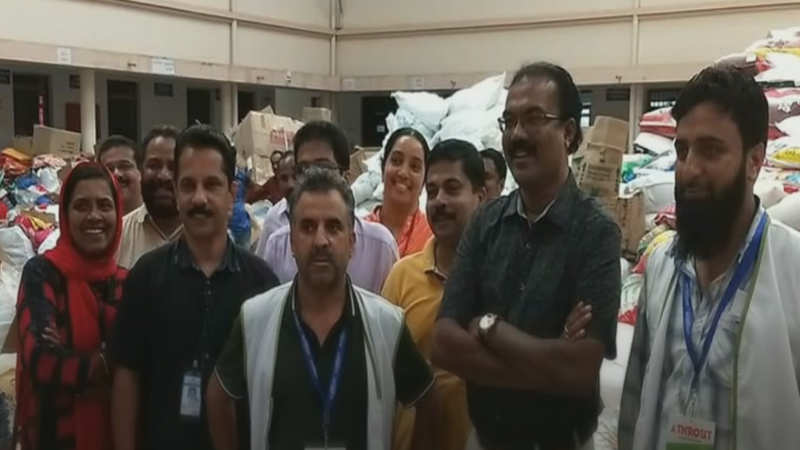Srinagar, JAMMU & KASHMIR :
The disastrous floods of 2014 in Kashmir is as vivid in Bilal’s mind as if it happened yesterday.
Along with his two brothers, he was stuck in his house in Srinagar for almost 12 hours. The three boys, who had already lost their parents, stared helplessly at the waters which seemed to reflect their fear of death. But fortunately for them, their uncle managed to find his way to their house in a boat and rescued them.
Bilal Ahmed Sofi, a 29-year-old marketing professional from Srinagar, was reminded of those days when he heard about the flood waters rising in the other end of the country, Kerala. The youngster, who has been working as part of a social service group who calls themselves Athrout Kashmir , kept everything else in the backburner and took off to Kerala, along with two other selfless souls from the group — businessmen Abdul Hamid and Waseem Hakim.
“We flew from Kashmir to Bengaluru first, to source some medicines. From there, we took off to Wayanad by road as it was in the news as one of the most affected districts,” says Bilal. The three-men army from Kashmir helped out the volunteers in Wayanad with medicines, supplies and more for almost a week here, and left only after assuring that if ever in need, they wouldn’t hesitate to come back and help again. “Athrout is a Kashmiri word which means a helping hand. We have many college students, youngsters and more as part of the group and we help with many things like conducting weddings of girls from poor families, helping the unemployed youth start a business, providing medicines, disaster relief, and more to those in need, wherever possible for us.” But then, what inspired them to come all the way to Kerala, from the other end of the country? “I believe that for volunteers, there are no boundaries,” says Bilal.
Hamid, who has also helped the victims of Chennai floods
in 2015, says, “I feel that the most difficult aspect during such a disaster is overcoming that mental stress, induced when watching your house getting torn down, nature in all her fury and being tormented by thoughts on what would one do from now on. Though there was a language barrier, we tried our best to talk to people and reassure them on how it’s still possible to rebuild their lives, from our own experiences.” The three also joined the various relief groups and visited villages, interacting with people, inquiring their needs and meeting them.
The three feel that when compared to how the authorities in Kashmir handled the floods, Kerala fared much better. Hamid says, “First of all, there was no religion causing any divide at least compared to the Northern States. People were helping each other out very well. We were given food from the house of one of the local volunteers and they were even ready to provide us accommodation.”
But it’s the local administration they praise the most. “The relief work was so systematic and well thought out. We could see that even the supplies we bought were first sorted and stored carefully, after which we were given a receipt. “This is a crisis, so we have to make sure all needs are taken care of,’ said some of the officials. When it happened back home, the counterparts there were only trying to save themselves and nothing more. Here, they were also tracking down dead bodies soon enough,” Bilal says.
At the same time, the trio feel that it’s time the government did something to form well-trained volunteer groups for such situations, across States. “Having a mind to serve is great, but it’s also important to have the right skills for it. For instance, a flood relief volunteer should know how to swim and what medicines would help the ailing. If there are such groups of interested citizens, the relief efforts can save lives better,” Bilal adds.
source: http://www.m.timesofindia.indiatimes.com / Times of India / Home> City / by Deepa Soman , TNN / August 31st, 2018









